Content
- Characteristic
- The table is ok
- Symptoms of the rise and fall
- Reasons for promotion and demotion
- How is it determined
- How to bounce back
- Antibacterial therapy
- Diet therapy
- Chemotherapy
- Surgery
- Taking probiotics
- Folk remedies
- Chamomile decoction
- Anti-inflammatory blend of aloe and honey
- Flax seed tea
- Fecal Calprotectin Video
Fecal calprotectin - it is a protein compound, which is used as a physiological marker for the detection of inflammatory diseases of the intestinal wall. An analysis for the level of this substance is prescribed for children, adult men and women with signs of ulcerative lesions of the gastrointestinal tract, chronic constipation, diarrhea of unknown etiology, disease Crown.
In the absence of acute or sluggish intestinal inflammation, the calprotectin rate always remains unchanged, not exceeding 50 μg per 1 g of biological material. In people with chronic diseases of the digestive system, the concentration of this substance in the composition of feces may be slightly increased.
Characteristic
Fecal calprotectin is a simple protein composed of 2 heavy and a similar number of light polypeptide bonds. The molecular weight of this substance is not more than 36 kDa. Calprotectin has the function of binding calcium, contains zinc molecules, has antifungal and bacteriostatic effects.
For the first time, fecal calprotectin was isolated in feces in 1980. By its nature of origin, this substance is a breakdown product of neutrophilic granulocytes. The presence of these cells in feces in adults and children indicates acute or chronic inflammation in the intestinal walls. In people with a healthy digestive system, the fecal calprotectin value remains within the normal range.
Calprotectin is characterized by the preservation of the stability of molecular bonds for 7 days. This substance is evenly distributed throughout the composition of the feces. The index of fecal calprotectin always corresponds to the numerical number of lymphocytes that were secreted in the intestine as a result of the body's immune response to a viral, bacterial or fungal invasion.
In some cases, an increase in the concentration of this substance is not associated with infection of the gastrointestinal tract by infectious microorganisms. For example, an increase in fecal calprotectin indicators is possible as a result of increasing inflammation of the intestinal walls caused by a tumor neoplasm.
The table is ok
In children under the age of 12 months, the concentration of fecal calprotectin in the feces is higher than 500 μg per 1 g of the test material. For newborns, such a study result is an indicator of the norm. In a child under 4 years of age, a gradual decrease in the PCF level to 100 μg per 1 g of feces is recorded. The table below shows the rates of fecal calprotectin for adult men and women, as well as children over 4 years old.
| FKP level in feces (unit μg / g) | Significance of research results |
| Less than 50 | Such a result suggests that the intestines of the patient undergoing diagnostics are in a satisfactory condition and have no signs of an inflammatory process. |
| 50 to 120 | A moderate increase in the level of fecal calprotectin is recorded. This result of the study of feces indicates the possible presence of a sluggish inflammation in the intestinal walls. The patient needs a more detailed diagnosis of the gastrointestinal tract and further observation by a gastroenterologist or therapist. |
| Over 120 | The subject's feces contain a very high level of PCF. The patient has a progressive inflammatory bowel disease. |
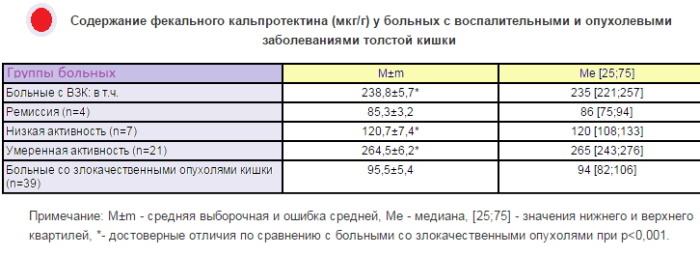
Calprotectin fecal (the norm in adults changes upward if a person for a long period of time took non-steroidal anti-inflammatory drugs) is determined in terms of biochemical laboratories. In order to obtain objective research results, it is enough to collect in a sterile container from 5 to 10 g of feces.
During transportation of biological material, it is necessary to control the temperature regime, which should be within + 2-8 degrees Celsius. Molecular bonds of PCP retain their stability for 7 days.
Symptoms of the rise and fall
A low level of fecal calprotectin, which does not exceed the level of 50 μg per 1 g of feces, does not manifest pathological symptoms. A similar diagnostic result suggests that the intestines of a child or an adult have no signs of inflammatory lesions by a tumor neoplasm or infectious microorganisms.
An increase in the concentration of PCP in the stool may be accompanied by the following symptoms:
- constant rumbling in the central and lower abdomen;
- attacks of spasmodic or cutting pain inside the abdomen;
- chronic diarrhea of unknown etiology;
- constipation;
- increased gas formation;
- painful sensations during bowel movements;
- impurities of blood in the composition of feces;
- complete or partial loss of appetite;
- physical weakness and general malaise;
- frothy stools with a fetid, putrid odor and a lot of mucus;
- obstruction of feces;
- an increase in body temperature to a level of 37-39 degrees, depending on the severity of the inflammatory process and the type of disease that has affected the digestive system.
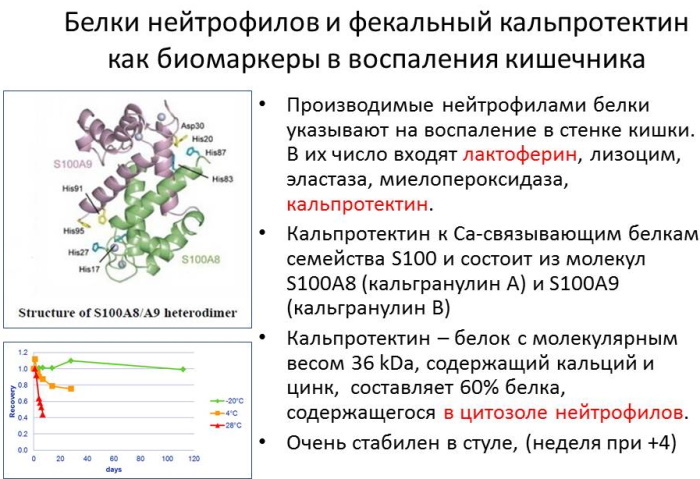
Symptoms of a painful condition of the intestine with a simultaneous excess of the norm of fecal calprotectin in the composition of feces indicates an increasing inflammation of the gastrointestinal tract. The primary tasks of a gastroenterologist are to stabilize the patient's vital signs, as well as to determine the current digestive disease.
Reasons for promotion and demotion
Fecal calprotectin (the norm in adults without signs of gastrointestinal pathology remains stable at throughout life) is below 50 mcg per gram of stool due to a healthy state intestines.
The increase in the concentration of PCP is caused by the influence of the following factors:
- too frequent use of medications with laxative properties;
- infection of the digestive tract with salmonellosis, rotavirus, adenovirus, and norovirus infection;
- allergic reactions of the body to cow's milk proteins;
- inflammation of the intestinal wall is caused by cystic fibrosis;
- individual gluten intolerance;
- diverticulitis;
- morbid obesity of the body;
- long-term intake of non-steroidal anti-inflammatory drugs, vitamin-mineral complexes and dietary supplements with a high concentration of calcium, zinc or magnesium compounds;
- nonspecific ulcerative colitis;
- enteropathy;
- Crohn's disease;
- intestinal polyposis of benign etiology;
- autoimmune gastritis;
- oncological neoplasms in the digestive tract;
- spread of campylobacter infection;
- the consequences of a surgical operation on the intestinal walls.
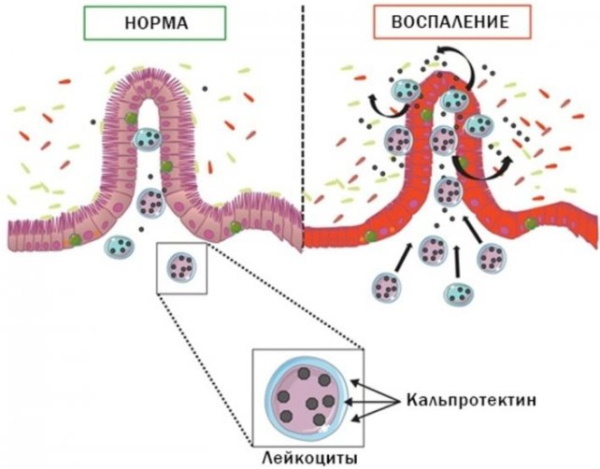
All of the above reasons for an increase in the rate of fecal calprotectin in fecal matter cause an acute disorder of the digestive system. As the gastrointestinal tract diseases progress, the manifestation of pathological symptoms increases.
How is it determined
To determine the indicators of FKP in feces, enzyme immunoassay is used. The delivery of biological material is carried out at home or directly in the diagnostic center, where the patient is examined.
The terms of the study of feces for the indicator of fecal calprotectin do not exceed 3 days. In most cases, the test results are known 1-2 days after the container of stool samples is delivered to the laboratory. This method of feces examination does not require compliance with any preparation rules.
How to bounce back
Fecal calprotectin (the norm in adults slightly increases in the presence of chronic inflammation Gastrointestinal tract) can be reduced to reference values if effective treatment of the underlying disease is carried out intestines. The choice of the method of therapy depends on the type of disease that disrupts the stable functioning of the digestive system.
Antibacterial therapy
Antibiotic medications are given to patients who have been diagnosed with inflammation of the intestinal wall caused by a bacterial infection. The type of medication is selected taking into account the strain of pathogenic microflora diagnosed during the examination.
To isolate the bacteria, an additional microbiological examination of the patient's feces is carried out. The selection of an antibiotic is carried out according to the principle of the effectiveness of its main component in relation to a specific type of bacterial microorganism.
In most cases, drugs of the following types are used:
- Metronidazole;
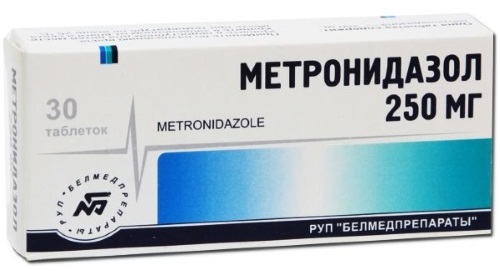
- Ofloxacin;
- Tsifran;
- Normax;
- Ciprofloxacin;
- Norbactin;
- Norfloxacin;
- Nolitsin.
The most effective in the treatment of intestinal infections that cause inflammation of the gastrointestinal tract with an increase the level of fecal calprotectin, antibacterial drugs from the group of fluoroquinolones are considered 2 generations. The above medicines can suppress pathogenic microflora and relieve inflammation of the intestinal walls.
Diet therapy
To normalize the indicators of fecal calprotectin and eliminate signs of inflammation of the intestinal walls, the following dietary rules must be observed:
- Avoid eating spicy, salty, pickled and too acidic foods.
- Do not eat food that has been cooked in oil or smoked.
- Prepare food products by boiling them in water, steaming, baking or stewing in their own juice.
- Include liquid and semi-liquid cereals in your diet.
- Exclude from the menu coarse, fibrous food, the advance of which injures the already inflamed organs of the gastrointestinal tract.
- Stop eating cabbage, radishes, sour fruits and vegetables.
- Every morning, drink 200-300 ml of natural kefir or yogurt, which was fermented by souring milk in natural conditions.
- Eliminate the use of confectionery, baked goods and yeast-based bread.
Alcohol, carbonated drinks, strong coffee and cocoa are completely prohibited. In case of individual gluten intolerance, it is necessary to stop eating products containing wheat, rye flour, oats and barley.
Chemotherapy
Chemotherapy drugs can normalize the level of fecal calprotectin if the increase in its concentration was caused by a malignant neoplasm in the intestinal walls. Medicines of this group are injected into the patient's body intravenously using drip solutions. The type of medication is selected individually, depending on the stage and type of cancer. Treatment with chemotherapy drugs is carried out in courses with a duration of 1 to 3 months.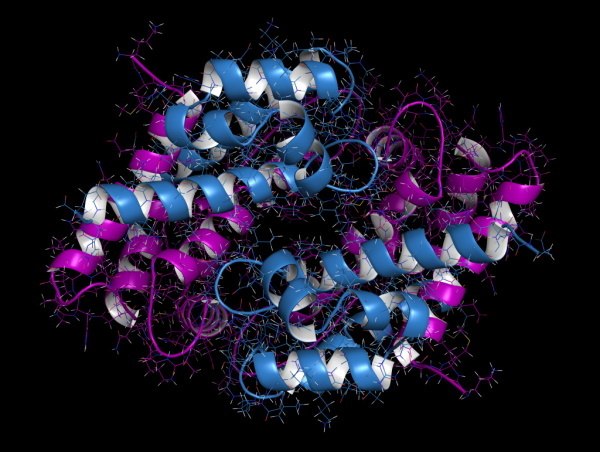
After the completion of each therapeutic stage, the patient re-takes tests that reflect his general condition. As the destruction of the malignant tumor with medicines, the functions of the gastrointestinal tract are restored, the severity of the inflammatory process decreases and the parameters of fecal calprotectin are normalized.
Surgery
Surgery is a radical treatment for the inflammatory process in the intestine. This method of therapy is indicated for patients with severe Crohn's disease, ulcerative lesions of the gastrointestinal tract, benign tumors, obstruction of feces. The surgery is performed in a sterile hospital environment. The patient is under general anesthesia.
The actions of the attending physician are aimed at sanitizing ulcerative formations that destroy the intestinal walls, restoring normal permeability of feces, and removing extraneous neoplasms. The period of complete recovery of the gastrointestinal tract after surgical treatment lasts from 1 to 3 months. depending on the complexity of the clinical case.
Taking probiotics
Inflammation of the intestinal wall with a moderate increase in the level of calprotectin in the stool may be caused by dysbiosis. The pathological condition of the gastrointestinal tract develops after prolonged antibiotic therapy, infection of the digestive system with a viral, fungal or bacterial infection.
To restore the balance of the intestinal microflora, the following drugs from the probiotic group are used:
- Linex (from 349 rubles);
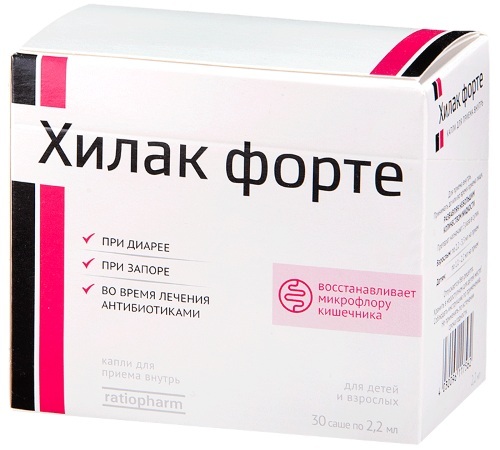
- Khilak Forte (from 257 rubles);
- Florin Forte (from 245 rubles);
- Normobact L (from 598 rubles);
- Acipol (from 495 rubles);
- Bifiform (from 300 rubles);
- Normoflorin L (from 248 rubles);
- Florok (from 482 rubles);
- Buck-set Forte (from 393 rubles);
- Rioflora (from 416 rubles).
The above preparations contain useful bifidobacteria and lactobacilli, which normalize the functions of the gastrointestinal tract, strengthen local immunity, prevent the development of inflammation of the walls intestines. Probiotics are taken 1-2 capsules per day. Preparations of this group, which are available in the form of a drinking suspension or free-flowing powder, are added to the composition of warm food or milk.
Folk remedies
It is possible to relieve inflammation of the intestinal walls and reduce the level of fecal calprotectin to the normal level using folk recipes. Medicinal plants with anti-inflammatory, antiseptic and wound healing properties are used as the main means of treatment.
Chamomile decoction
To prepare this folk remedy for inflammatory bowel diseases, the following algorithm of actions must be observed:
- Take 2 tbsp. l. dried chamomile.
- Pour 300 ml of running water over the plant.
- Bring the future medicine to a boil, and then boil for 3 minutes.
- After a specified period of time, the chamomile broth is removed from the stove.
The resulting product must be left for 4 hours to cool and infuse. A decoction of chamomile to relieve intestinal inflammation and normalize the level of calprotectin is taken in 150 ml in the morning and in the evening for 15 minutes. before the meal. The duration of treatment is at least 10 days.
Anti-inflammatory blend of aloe and honey
A folk remedy in the form of a mixture of aloe and honey pulp has a pronounced anti-inflammatory and wound healing effect.
This home remedy for a painful bowel condition is prepared as follows:
- Grind 5 aloe leaves to a gruel state.
- Add 1 tbsp to the flower mixture. l. honey collected in June-July from herbs.
- Mix the constituent components of the folk remedy thoroughly.
Home remedy for intestinal inflammation is left for 3 hours in the refrigerator, so that under the influence of honey, aloe vera juice. The resulting product is taken for 1 tsp. l. 3 times a day for 20 minutes. before meals. The duration of the therapeutic course is from 7 to 14 days. The use of this folk remedy is contraindicated in people with diabetes mellitus and allergies to bee products.
Flax seed tea
To normalize the level of fecal calprotectin and relieve intestinal inflammation, it is recommended to use tea based on flax seeds, the preparation of which is as follows:
- Take 2 tsp. l. flax seeds.
- Pour 200 ml of boiling water over the herbal ingredient.
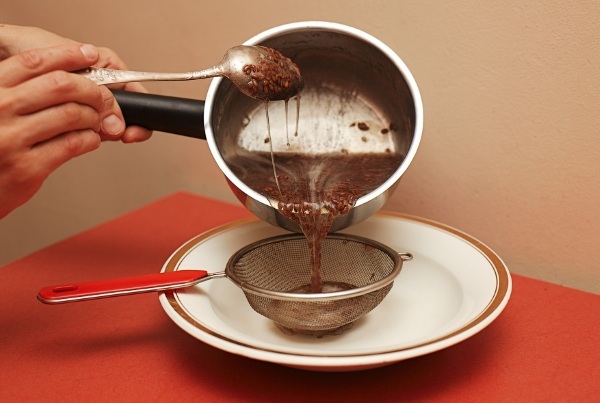
- Cover the cup with a lid for 20 minutes.
- At the end of the specified period of time, drink the finished product.
Anti-inflammatory tea based on flax seeds should be drunk 1 time per day on an empty stomach for 25 minutes. before breakfast. The duration of the therapeutic course is from 10 to 20 days, depending on the severity of the inflammatory process in the intestine.
Fecal calprotectin is a simple protein that binds calcium and zinc ions. This substance is formed as a result of the physiological activity of lymphocytes in response to acute or chronic inflammation of the intestinal walls. In adults and children over 4 years old, the rate of calprotectin should not exceed 50 μg per 1 g of feces.
The presence of higher values indicates a pathological condition of the gastrointestinal tract. A sharp increase in the level of FPK causes ulcerative colitis, intestinal obstruction, tumor neoplasms of benign and oncological nature, Crohn's disease, infectious invasions.
Fecal Calprotectin Video
Who should take fecal calprotectin and why:



